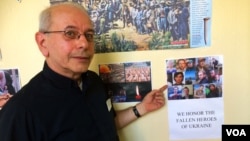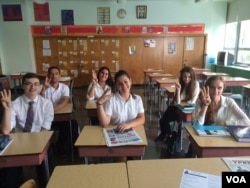A cease-fire in Ukraine between government troops and pro-Russian separatists has brought a temporary lull in the crisis gripping that country. But many of the estimated 1.2 million Americans of Ukrainian descent remain tense, fearful and angry.
At Saint George Academy, a Catholic school in the heart of New York City’s Ukrainian-American community, the high school students know the Ukrainian national anthem by heart - and they sing it regularly and with gusto. Most were either born in Ukraine, or their parents were.
War and peace in the same heart
Their school’s principal, Rev. Peter Shyshka, himself the son of Ukrainian immigrants, encourages the teenagers’ patriotic pride. He believes it may be necessary for Ukraine to go to war rather than lose its independence, which it won in 1991 after the breakup of the Soviet Union.
“What’s the alternative?” Shyshka asks with a grimace. “Do we want the same domination we’ve had for centuries with Russia that they think this is their empire? We’ve had enough of that.”
Still, the priest says current events also call for prayer and inward reflection.
“Where do we stand? Are we compassionate people? Are we supportive of those that are suffering or undergoing persecution? We can’t just be screaming with placards," he said. "Anger isn’t going to do it, and hate isn’t going to do it.”
Shyshka’s pupils also have seemingly contradictory viewpoints. Some have family friends who recently returned to Ukraine from New York to fight the pro-Russian separatists.
“Honestly, the people who go over there to fight are just literally volunteering to give up their life for the sake of their country,” says Xenia Vitovych, who still speaks with a slight Slavic accent. "They are fighting for their independence and their homeland, and they are fighting against people who know how to fight.”
Bake sales, first aid kits, emotional support
Others are organizing bake sales or working for Ukrainian diaspora organizations to raise money to purchase emergency first aid kits and others supplies for the army.
Alexandra Azer, whose father is Egyptian and mother is Polish, is trying to offer her Ukrainian American classmates emotional support.
“You hear how sad they are. We try to tell them everything is going to be okay," she said. "We try to listen and to make sure we are updated with the news and that we’re not clueless as to what’s going on.”
In the Saint George church, adjacent to the school, Alexandra Rakowsky glances at the golden icons arrayed in the cavernous space. She was a small child when she came to this country just after World War II, yet remains deeply attached to her ancestral homeland.
“So when something is happening on a scale that is happening in Ukraine now, we tend to be very worried and tend to write letters to our congressmen and senators, and try to help financially through different channels,” she said.
Lobbying U.S. policymakers to act forcefully
The Ukrainian Congress Committee of America, an umbrella coalition of 20 Ukrainian-American groups, is organizing demonstrations and lobbying the U.S. government to act more forcefully, first, by joining with its NATO allies to designate Ukraine a “major non-NATO ally.”
“That would immediately cut down on red tape on the transfer of military supplies back and forth,” says spokesman Andrij Dobriansky. “Another thing is sending supplies - anti-tank munitions, anti-aircraft munitions, [and] any kind of equipment that can help Ukraine to secure its borders. We also need expert military training and far tighter sanctions on Russia.”
Dobriansky’s group believes Vladimir Putin’s Russia is waging a war to erase Ukraine. Still, he remains optimistic. A quarter century ago, many doubted Ukraine would ever become independent.
“We were supposed to have been wiped off the map for good hundreds of years ago,” he says. “Yet here we are.”






